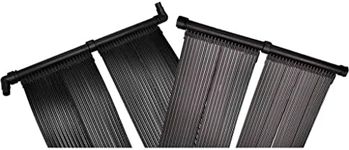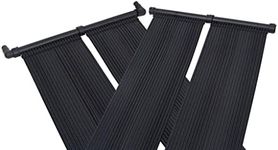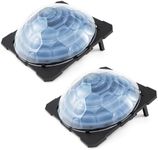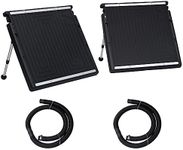Buying Guide for the Best Solar Pool Heaters
Choosing the right solar pool heater involves understanding how these systems work and what features are most important for your specific needs. Solar pool heaters use energy from the sun to heat your pool, making them an eco-friendly and cost-effective option. When selecting a solar pool heater, consider factors such as the size of your pool, your climate, and how often you use your pool. These factors will help you determine the right specifications and features that will best suit your needs.Collector AreaThe collector area is the surface area of the solar panels that capture sunlight to heat your pool. This is a crucial spec because it determines how much solar energy can be absorbed and converted into heat. Generally, the larger the collector area, the more efficient the heating process. For smaller pools or warmer climates, a smaller collector area may suffice. However, for larger pools or cooler climates, a larger collector area is necessary to ensure adequate heating. Consider the size of your pool and the average temperature in your area to decide on the appropriate collector area.
EfficiencyEfficiency refers to how well the solar pool heater converts sunlight into usable heat for your pool. Higher efficiency means more heat is generated from the same amount of sunlight, which can be particularly important in areas with less consistent sunlight. Efficiency is often expressed as a percentage, with higher percentages indicating better performance. If you live in a region with less sun exposure, opting for a higher efficiency model can help maximize the heating potential of your system.
Durability and MaterialsDurability and materials are important because they affect the longevity and maintenance needs of your solar pool heater. Common materials include plastic, rubber, and metal, each with its own benefits and drawbacks. For instance, metal components may offer greater durability but can be more expensive, while plastic or rubber may be more affordable but less durable. Consider the environmental conditions your heater will face, such as exposure to saltwater or harsh weather, to choose materials that will withstand these conditions over time.
Installation and CompatibilityInstallation and compatibility refer to how easily the solar pool heater can be set up and integrated with your existing pool system. Some systems are designed for easy DIY installation, while others may require professional help. Additionally, ensure that the heater is compatible with your pool's size and plumbing. If you prefer a straightforward setup, look for models that offer clear instructions and compatibility with standard pool systems. If your pool setup is unique, you may need to consult with a professional to ensure proper installation.
Warranty and SupportWarranty and support are important considerations as they provide peace of mind and protection for your investment. A good warranty can cover repairs or replacements if the system fails due to manufacturing defects. Look for warranties that offer coverage for several years, as this indicates the manufacturer's confidence in their product. Additionally, consider the availability of customer support, as having access to knowledgeable assistance can be invaluable if you encounter issues with your solar pool heater.













